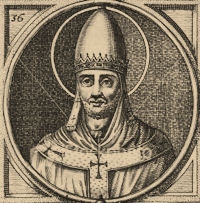Easter: April 12th
Friday of the Second Week of Easter
Other Commemorations: Julius I, Pope (RM)
» Enjoy our Liturgical Seasons series of e-books!
Today the Roman Martyrology commemorates Pope St. Julius I (d. 352),, a Roman who was chosen pope on the 6th of February in 337. He ruled the Church until 352 and received the appeal from St. Athanasius, whom he defended against his Arian accusers. The letter he wrote to the East on this occasion is one of the most momentous pronouncements of the Roman See. He built several churches in Rome and ranks as one of the most distinguished occupants of the Holy See.
Meditation for Friday of the Second Week of Easter
The Sacrament of Penance
1. "At that time, when it was late that same day [Easter Sunday], the first of the week, and the doors were shut, where the disciples were gathered together for fear of the Jews, Jesus came, and stood in the midst, and said to them: Peace be to you. And when He had said this, He showed them His hands and His side. The disciples therefore were glad when they saw the Lord. He said therefore to them again: Peace be to you. As the Father hath sent Me, I also send you. When He had said this, He breathed on them, and He said to them: Receive ye the Holy Ghost; whose sins you shall forgive, they are forgiven them, and whose sins you shall retain, they are retained" (Gospel).
The sacrament of penance is the gift of the risen Christ to Ho Church, St. Jerome calls it a "second plank after our ship wreck," and Tertullian refers to it as "an arduous baptism." It is a marvelous means of salvation for those baptized.
2. "Whose sins you shall forgive, they are forgiven them." Christ sacrificed even His life for the salvation of men. Could He have done more for us? Should not the remembrance of the crucified One and the memory of His death for us inspire us with so great a love that we could never sin again? We have, moreover, the strength and the grace provided by the Eucharist, through which He gives Himself to us for the nourishment of our souls. Does not the Eucharist have the power to sanctify us so that we can overcome all sin, so that sin can no longer have any part in us? But Christ, knowing the weakness and the wickedness of men, approaches His Church on Easter might and provides her with yet another means for the remission of sin, for the healing of the wounds caused by sin, and for strengthening us against sin. He gives us the sacrament of forgiveness, of mercy, of reconciliation, a means whereby we may regain peace with God and with ourselves. "Peace be to you." This holy sacrament is His Easter greeting to His apostles, to His Church, and to us. He thus provides a new proof of His love and solicitude for us. He wishes to enrich us with grace and grant us forgiveness, even when we have been unfaithful.
"Peace be to you." He sets no limits to the number of times we may receive this sacrament, for He knows only too well our weakness and our instability. Neither does He set any limit on His mercy in this sacrament. There is no sin, however frightful, which cannot be forgiven. Even venial sins and the daily minor failings of which we are guilty, are matter for this sacrament. "Whose sins you shall forgive, they are forgiven them." Christ's mercy in giving us this sacrament shows us how concerned He is that we become incorporated in Him through baptism and the Eucharist. He wills that we be free from all sin and live as pure children of God. He desires that we begin a new life, free of all sin or infidelity to the Father. Would that we might carry out His designs!
Not only are the various mortal sins which we commit forgiven and destroyed by this sacrament, but also our venial sins and faults. Christ wills that through baptism and the Eucharist we become so firmly implanted in Him that we are freed from all sin and become children of God. He wills that we begin to live a new life that will be free from the slightest fault, and avoid even the smallest infidelity to His Heavenly Father. It is for this reason that the Church insists that all those who dedicate themselves to the quest of perfection such as priests and religious, receive this sacrament and its graces every week. She looks upon the "frequent" reception of this sacrament as an excellent means of acquiring Christian perfection. "By it genuine self-knowledge is increased, Christian humility grows, bad habits are corrected, spiritual neglect and tepidity are resisted, the conscience is purified, the will is strengthened, a salutary self-control is attained, and grace is increased in virtue of the Sacrament itself" (Pius XII, Encyclical, Mystici Corporis, Part III, 88). If the Sacrament can accomplish all these things for us, how zealously we should use it.
3. We acknowledge with gratitude and faith the precious Easter gift which the Lord has given us in the sacrament of penance. We recognize the apostles and their successors, the bishops and priests, as having the commission and the power to forgive or retain our sins. They are, therefore, placed over us as judges of our conscience. Because of these Easter gifts we subject ourselves in obedience and with confidence to the priests who have been placed over us. From them we seek and receive the forgiveness of our faults.
Since the Lord receives us in the sacrament of His mercy with so much love and solicitude, it is fitting that we respond to His advances with a like generosity. Knowing the importance and the efficacy of this sacrament, we should be eager to use it for the salvation of our soul and the enrichment of our spiritual life.
—Benedict Baur, OSB, The Light of the World
St. Julius I
 With Pope St. Julius the Papacy finds at its doorstep the vexing problem of the Eastern Arians. It is true that the Council of Nicaea had condemned Arianism, but in spite of that Arians had been growing in strength and had even gained the ear of Constantine, and what was more crucial, that of his son Constantius who succeeded him in the East.
With Pope St. Julius the Papacy finds at its doorstep the vexing problem of the Eastern Arians. It is true that the Council of Nicaea had condemned Arianism, but in spite of that Arians had been growing in strength and had even gained the ear of Constantine, and what was more crucial, that of his son Constantius who succeeded him in the East.
The man who was compelled to face the problem was Julius, a Roman who had been chosen to succeed Mark after an unexplained interval of four months. He soon received delegates from Alexandria asking him to acknowledge a certain Pistus as bishop of Alexandria in place of Athanasius, the mighty fighter for orthodoxy. The delegates tried to prove that Athanasius, who actually had been the victim of Arian intrigue, had been validly deposed. Athanasius on his part also sent envoys and later came to Rome in person to plead his case before the Pope. The Arians asked Julius to hold a synod to decide the case, but when in 341 Julius actually did convene it, they refused to attend. The Pope held it without them and over fifty bishops decreed that Athanasius had been unjustly condemned. Julius informed the Arians at Alexandria of this decision and let them know that he was displeased at their uncooperative attitude.
The Emperor Constans, who ruled in the West, was favorable to the orthodox Christians while his brother Constantius, who ruled the East, was pro Arian. At this time both Emperors agreed to hold a big general council to see if religious unity could be achieved. Pope Julius approved of the plan and sent legates to Sardica, the modern Sofia, where the council gathered. The council did not achieve religious unity because the Arians, when they found themselves outnumbered, walked out. The council once again vindicated Athanasius and once more repeated the solemn Nicene Creed. It also left an interesting set of regulations on the manner in which appeals to the pope should be made.
In spite of the repeated vindications of Athanasius, that good man was unable to return to his see. Emperor Constans supported the Arian George until the usurper died. Then and only then was the long-suffering Athanasius allowed to go home. Pope Julius, delighted, wrote a letter to the people of Alexandria, congratulating them on the return of their true bishop.
At Rome the number of Christians continued to grow during the pontificate of Julius. He built two new basilicas and three cemetery churches. The stay of St. Athanasius at Rome helped to popularize Egyptian monasticism and gave an impetus to religious life there.
Pope St. Julius died April 12, 352. He was buried in the Cemetery of Calepodius. His feast is celebrated on April 12.
—Excerpted from Popes Through the Ages by Joseph Brusher
Highlights and Things to Do:
- Learn more about Pope St. Julius:






